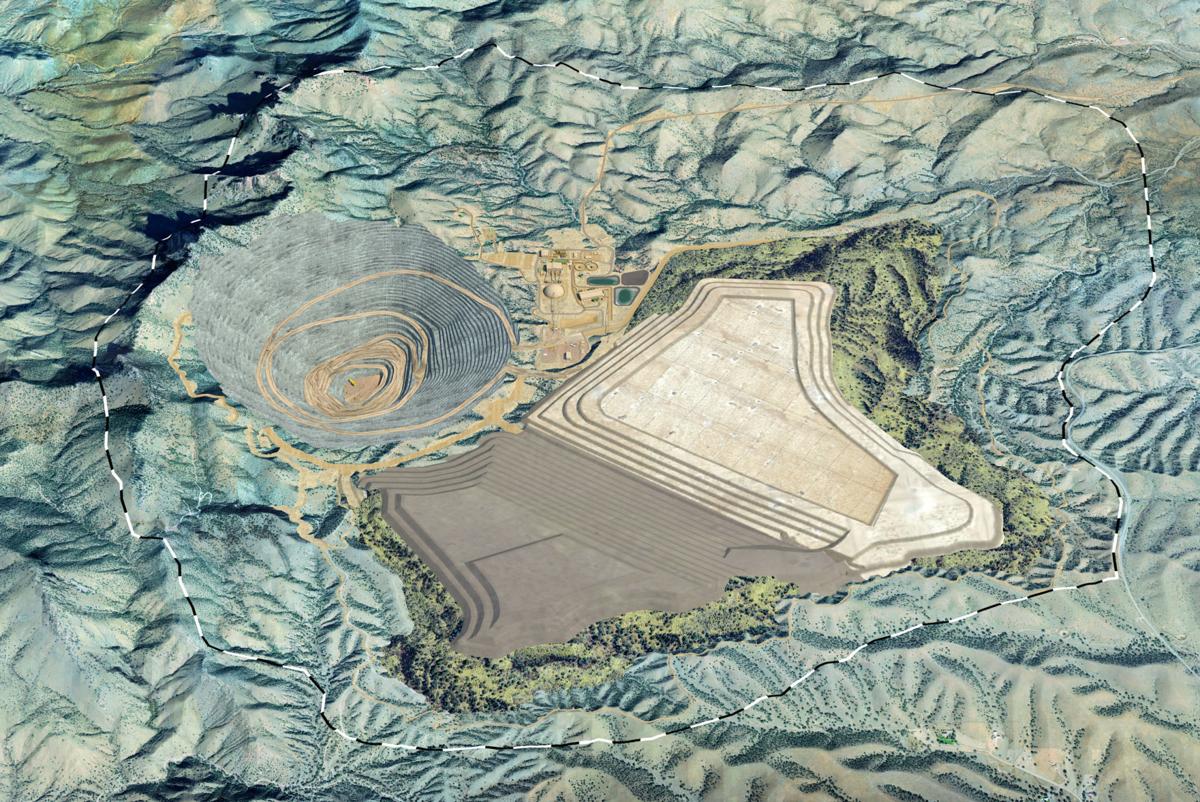Opponents of the Rosemont Mine filed suit Wednesday to try to overturn the final permit authorizing the mine’s construction.
Hammering at procedural and substantive issues, numerous opposition groups accused the U.S. Army Corps of Engineers of violating federal laws, regulations and guidelines in approving the Clean Water Act permit for the open-pit copper mine.
On March 8, the Army Corps issued the permit to allow Hudbay Minerals Inc. to discharge dredged and fill material into nearly 38 acres of washes on the mine site. It was the final government permit needed to construct the $1.9 billion project in the Santa Rita Mountains south of Tucson.
The agency’s 81-page decision concluded that the mine will serve the public interest, that its plan to mitigate for damages to washes on the mine site is adequate, and that some of the most damaging impacts opponents say it will cause are not within the Corp’s legal scope of analysis.
But the 94-page lawsuit, filed in U.S. District Court in Tucson, alleges that the Corps violated the Clean Water Act, the National Environmental Policy Act and the Administrative Procedures Act in approving the mine.
The lawsuit hits particularly hard at the Corps’ unwillingness to consider most mine impacts beyond those from grading, clearing and grubbing the washes.
It said the Corps was legally required to also consider impacts caused by excavation of the mine’s half-mile-deep open pit and placement of waste rock and tailings in the wash areas.
These activities would place 66,792 cubic yards of tailings and 19,941 cubic yards of waste rock on the affected washes, the suit said, citing a 2011 public notice the Corps issued to disclose the mine’s permit application.
The lawsuit also repeatedly refers to the detailed and severe written criticisms made of the project over the years by the U.S. Environmental Protection Agency, the Bureau of Land Management and the Arizona Game and Fish Department.
It also cited what it said were several violations of legal requirements to notify the public and analyze impacts of changes in some of the mine plans and of the scope of the Corps’ review of the project.
This is the fourth lawsuit filed seeking to stop Rosemont since the U.S. Forest Service issued a separate approval in June 2017. Two of the other lawsuits challenge that approval.
The fourth suit challenges the U.S. Fish and Wildlife Service’s final biological opinion that said Rosemont won’t violate the Endangered Species Act. All the suits are pending.
Unless opponents can land an injunction or restraining order delaying or halting mine construction, the way is legally clear for the mining company to start construction. The last formal hurdle disappeared March 20, when the Forest Service approved a formal mine plan of operations for the project.
Hudbay has not said when it plans to start construction, a process likely to take close to two years. It recently promised to provide opponents 30 days’ notice before it starts grading for the project, in legal paperwork filed in conjunction with one of the suits.
Filing Wednesday’s lawsuit were Save the Scenic Santa Ritas, the Center for Biological Diversity, the Sierra Club’s Grand Canyon Chapter, and the Arizona Mining Reform Coalition, an umbrella organization representing 16 groups.
The Army Corps does not comment on pending litigation, said Edward Coffey, a Corps spokesman.
Hudbay, which wasn’t named as a defendant in the suit, didn’t respond to a request from the Star for comment on the case.
Specifically, the lawsuit alleged the Corps’ decision to analyze only impacts of grading, filling and grubbing the washes was “a transparent, last-minute attempt to avoid the statutory and regulatory obligation” to consider secondary impacts of allowing the use of federally controlled washes to build and operate the project.
“The Corps unilaterally divested itself of any responsibility under the (Clean Water Act) to consider the direct, indirect, cumulative, and secondary impacts from the operation of the mine, even though that is the entire purpose for which Rosemont applied for this permit,” the lawsuit said.
This means, for instance, no consideration of direct impacts to Wasp and Barrel canyons, which will be filled for the project, and to Davidson Canyon downstream, from contaminated runoff and seepage from Rosemont’s waste rock and tailings, the suit said.
It also means no consideration of indirect impacts such as elimination or reducing of water flows in the adjoining Las Cienegas National Conservation Area from pumping out the aquifer for the open pit, and the creation of a toxic pit lake after the mine closes and the pumping stops, the suit said.
It noted that until the Corps approved the permit this month, the agency had never notified the public of any change in its formal scope of analysis for the project since publishing its only public notice on the permit in 2011.
In that notice, the Corps said the digging of the pit and the dumping of waste rock and tailings would amount to impacts to federally regulated washes that would require analysis.
The suit also criticized the Corps for not notifying the public of a change in Hudbay’s mitigation plans for the project in 2017, and for not notifying the public that this plan to rehabilitate and re-establish stretches of Sonoita Creek in Santa Cruz County would require discharge of fill material into 8.9 acres of washes.
The Corps, in approving the permit, said it had concluded that once the washes are filled with material from clearing and grading them, they will no longer be legally considered federally regulated. Therefore, additional impacts from waste rock, tailings and the open pit would no longer be considered impacts to the washes and can’t legally be analyzed, the Corps said.
The Corps said it isn’t required to follow public notice requirements for changes to the mine’s mitigation plan or for the final plan itself, under 2008 federal guidelines for handling such plans.





